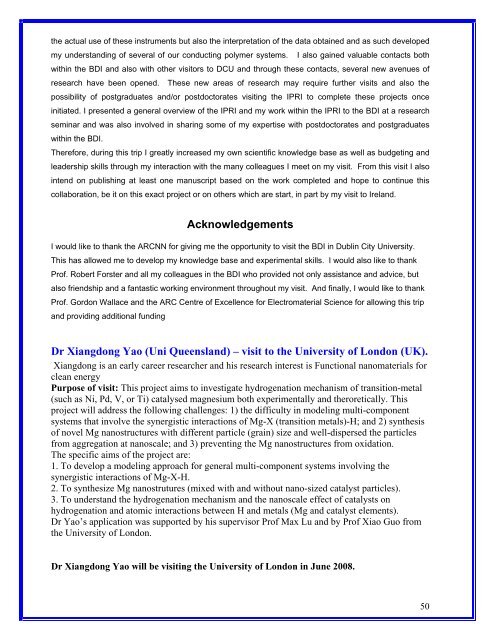Annual Report 2007 - The Australian Nanotechnology Network
Annual Report 2007 - The Australian Nanotechnology Network
Annual Report 2007 - The Australian Nanotechnology Network
Create successful ePaper yourself
Turn your PDF publications into a flip-book with our unique Google optimized e-Paper software.
the actual use of these instruments but also the interpretation of the data obtained and as such developed<br />
my understanding of several of our conducting polymer systems. I also gained valuable contacts both<br />
within the BDI and also with other visitors to DCU and through these contacts, several new avenues of<br />
research have been opened. <strong>The</strong>se new areas of research may require further visits and also the<br />
possibility of postgraduates and/or postdoctorates visiting the IPRI to complete these projects once<br />
initiated. I presented a general overview of the IPRI and my work within the IPRI to the BDI at a research<br />
seminar and was also involved in sharing some of my expertise with postdoctorates and postgraduates<br />
within the BDI.<br />
<strong>The</strong>refore, during this trip I greatly increased my own scientific knowledge base as well as budgeting and<br />
leadership skills through my interaction with the many colleagues I meet on my visit. From this visit I also<br />
intend on publishing at least one manuscript based on the work completed and hope to continue this<br />
collaboration, be it on this exact project or on others which are start, in part by my visit to Ireland.<br />
Acknowledgements<br />
I would like to thank the ARCNN for giving me the opportunity to visit the BDI in Dublin City University.<br />
This has allowed me to develop my knowledge base and experimental skills. I would also like to thank<br />
Prof. Robert Forster and all my colleagues in the BDI who provided not only assistance and advice, but<br />
also friendship and a fantastic working environment throughout my visit. And finally, I would like to thank<br />
Prof. Gordon Wallace and the ARC Centre of Excellence for Electromaterial Science for allowing this trip<br />
and providing additional funding<br />
Dr Xiangdong Yao (Uni Queensland) – visit to the University of London (UK).<br />
Xiangdong is an early career researcher and his research interest is Functional nanomaterials for<br />
clean energy<br />
Purpose of visit: This project aims to investigate hydrogenation mechanism of transition-metal<br />
(such as Ni, Pd, V, or Ti) catalysed magnesium both experimentally and theroretically. This<br />
project will address the following challenges: 1) the difficulty in modeling multi-component<br />
systems that involve the synergistic interactions of Mg-X (transition metals)-H; and 2) synthesis<br />
of novel Mg nanostructures with different particle (grain) size and well-dispersed the particles<br />
from aggregation at nanoscale; and 3) preventing the Mg nanostructures from oxidation.<br />
<strong>The</strong> specific aims of the project are:<br />
1. To develop a modeling approach for general multi-component systems involving the<br />
synergistic interactions of Mg-X-H.<br />
2. To synthesize Mg nanostrutures (mixed with and without nano-sized catalyst particles).<br />
3. To understand the hydrogenation mechanism and the nanoscale effect of catalysts on<br />
hydrogenation and atomic interactions between H and metals (Mg and catalyst elements).<br />
Dr Yao’s application was supported by his supervisor Prof Max Lu and by Prof Xiao Guo from<br />
the University of London.<br />
Dr Xiangdong Yao will be visiting the University of London in June 2008.<br />
50



